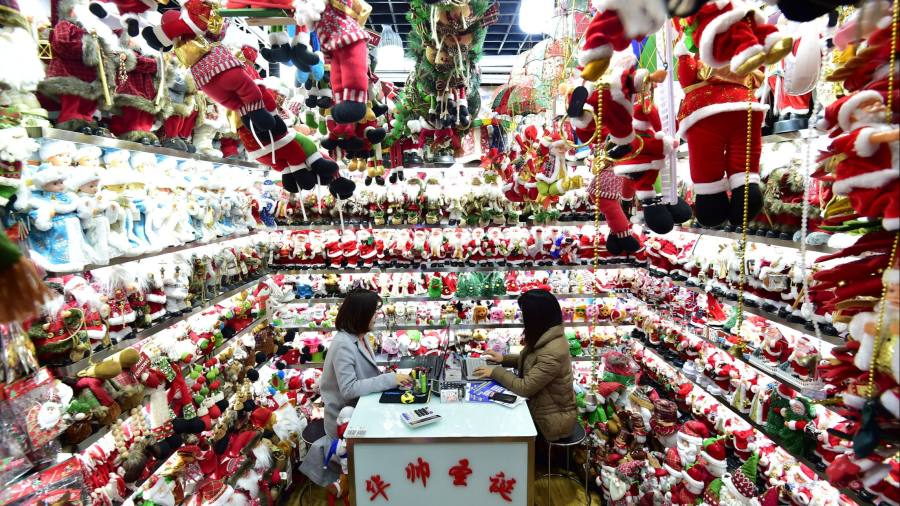In the Chinese city of Yiwu, home to the world’s largest wholesale market for small manufactured goods, sock exporter John Zhu is encouraged by the growing number of Russian businessmen willing to pay in yuan.
“Russia’s break with the West leaves the country with no choice but to rely on the yuan to keep the economy afloat,” Zhu said, noting that customers in Moscow send yuan payments via WeChat, a Chinese social media app. “We are a beneficiary of this trend.”
With 75,000 stores, Yiwu is known as China’s Trinket City, a multibillion-dollar trade hub for everything from Christmas decorations to toys, umbrellas to pencils.
It is also at the center of a decade-long experiment in internationalizing the yuan as Beijing seeks to strengthen the role of the world’s second-largest economy in the global financial system. Traders in Yiwu said progress had been slow, but more people had started using yuan to settle contracts since Moscow was cut off from dollar funding by Western sanctions following its invasion of Ukraine.
Yiwu’s annual yuan trade settlement volume has surged fivefold since 2019, reaching about 56.5 billion yuan ($8 billion) last year, official statistics show. This far exceeds the national average, which has increased by more than 80% over the same period.
“Yiwu is at the forefront of China’s efforts to make the renminbi an international currency,” said Wang Dan, chief China economist at Hang Seng Bank.
Last year, just over a tenth of the export hub’s trade was settled in yuan, with the dollar accounting for more than 80 percent of trade, according to official statistics. China’s export-oriented yuan trade settlement accounts for less than 7 percent of total exports, compared with nearly 12 percent in Yiwu, according to a foreign policy adviser to the central government.
Beijing encourages the use of the yuan, and by the end of last year it had signed currency-swap agreements with 40 countries, including Argentina and Brazil. The swap agreement, which allows the central bank to provide yuan liquidity to commercial banks in the event of a shortage, has helped boost confidence among businesses nervous about using the yuan for trade.
Several factors have contributed to the increased use of RMB in Yiwu, not all of which can be easily replicated.
Yiwu was one of the first cities in China to allow individual merchants to settle large cross-border transactions in renminbi. Most cities have an annual cap of $50,000. Given Yiwu’s reputation for high prices and flexible terms, and the fact that wholesalers pay neither corporate tax nor market rent, exporters have enough bargaining power to demand settlement in RMB.
“When you have only one place to buy something, the seller will figure out how to settle the transaction,” said James Wu, a furniture exporter in Yiwu, who last year began requiring Middle Eastern customers to pay in yuan.
Yiwu has long had close trade links with emerging economies and is more open to yuan transactions, traders said.
Senegalese trader Mouhamadou Pouye has largely eschewed the dollar, instead settling most of his trades in yuan. “I can’t say that the yuan will replace the dollar,” said Pouye, who buys Chinese electronics and medical equipment in Yiwu to sell in his native Senegal. “But dollar transaction volumes have declined year-on-year.”
However, analysts warn that limited offshore reserves and China’s strict capital controls will limit the yuan’s adoption. Tan Xiaofen, a finance professor at Beijing University of Aeronautics and Astronautics, said: “The institutional support for the RMB to go global is not strong enough.”
To facilitate global use, China needs to give up control of the renminbi exchange rate and remove capital controls, allowing the renminbi to circulate freely like the U.S. dollar. But policymakers have placed such controls in high regard and shown little willingness to abandon them.
According to a Beijing-based adviser to the People’s Bank of China, many foreign central banks already hold yuan reserves for emergencies, such as repaying foreign debt. “Some policymakers in developing countries don’t want to make full use of the offshore yuan, even though local businessmen are keen to do so,” the person said.
Since there is no renminbi to settle overseas, many Yiwu businessmen use underground money houses to exchange currencies such as West African CFA francs into renminbi at low cost to facilitate trade.
Wu, a furniture exporter, said a quarter of his sales in renminbi are paid through third-party brokers.
This arrangement has its own drawbacks. Authorities have frozen tens of thousands of bank accounts of Yiwu businessmen in recent years due to money laundering risks, local banks and state media reported.
Increased trade with Russia in the wake of the Ukraine conflict could also pose compliance issues. “If we are caught by the U.S. government for violating sanctions rules and reaching a 200,000 yuan trade settlement with Russia, we may be fined 2 billion yuan,” the official said.
Other obstacles are more prosaic.
Back at his booth in the huge Yiwu International Trade City, Zhu, a sock exporter, said he stopped seeking payments in yuan from an Ethiopian client this year because a lack of foreign exchange reserves meant he would have to wait a long time for yuan.
“I won’t wait another three weeks to receive yuan, because I can get paid in dollars immediately,” he said.


